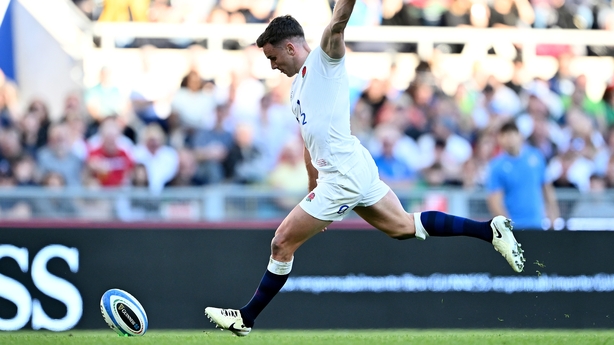Ireland and England will square off in Twickenham on Saturday evening, as the Guinness Six Nations championship returns.
Ireland will be favourites despite having to travel to London. There are issues on and off the field in England at the moment and Twickenham as a home ground isn't the fortress that it once was.
However, I'd be very wary that there’s one big performance in this England side during this tournament.
Andy Farrell will focus on their own performance, because that’s the only thing that they can really control.
However, England have a chance to use Ireland as a stepping stone to refocus their current rebuild under Steve Borthwick, which is a dangerous prospect.
England’s biggest issue currently is that they are stuck between Borthwick’s style of play - which is quite reliant on structure and kicking compared to other teams in the championship - and a more expansive game.
England have the players to embrace a more attacking mindset. We’ve seen it in the past from teams like Bath and Saracens, and Northampton are currently taking on that mantle as England’s fast-attacking side.
Tommy Freeman and George Furbank represent this exciting brand of rugby, while Alex Mitchell was key to its success before getting injured.
However, others have played a more attacking brand of effective gainline decision-making in the past.

George Ford (above) is an underrated attacking orchestrator when he’s got the right game plan and tools around him. His ability to pick the right pass is greater than most, but he’s been pigeon-holed into being this kicking maestro.
One of the most exciting parts of England’s game at the moment is identifying which style of kick will come off Ford’s boot, the spiral bomb being a luxury and a difficult skill in the heat of a game. That’s not enough to see the old Twickenham atmosphere return just yet.
England showed flashes of their attacking ability with a set-piece try from the scrum against Scotland. They ran multiple attacking threats at the line simultaneously and caused Scotland issues before Furbank scored on his return to international duty.
One of the biggest giveaways around the England and Borthwick game plan this weekend will be whether Borthwick sticks with Furbank and his error-strewn attempt at expanding their attacking game.
Furbank dropped a pass that was fizzed towards his head when trying to pump energy into the English attack - one of 25 handling errors and 22 turnovers which saw Duhan van der Merwe acrobatically finishing in the corner.
Change is difficult at any stage, but it's particularly difficult when you attempt to make what seems like a sudden change in attacking strategy during a Six Nations tournament.
England will have the chance to build a game plan to beat Ireland with an extra week in preparation, given the weekend off in the Six Nations last week. Borthwick only needs one big, disruptive performance from his squad for the hope to come back.
Freddie Stewart was unlucky to be left out against Scotland, his omission made way for the Furbank and English attacking revolution that didn’t go to plan. Will Borthwick revert to type and pick the Leicester Tiger to deal with Ireland’s kicking game, while shoring up the English kick chase?
Where England could cause Ireland trouble is around their defence and the catalogue of intel that Felix Jones built up at last year’s World Cup. South Africa used intense line speed and a breakdown focus to send Ireland off script in attack.
By disrupting their ball, South Africa made Ireland commit different bodies to breakdowns while losing their flow in attack.
They also attempted to spook Ireland with line speed and set piece disruption, which seems to be in a better place now under Paul O’Connell.
I’m not sure that the Jones defence has bedded in fully in England yet. They were beaten in a straightforward set-piece for Van Der Merve’s first try which leads me to believe that they aren’t fully comfortable yet and with Ireland’s intricacies in attack, their defence could be exposed while it’s still in transition.
If England are to have any chance against Ireland, they will need a full-time minder for Bundee Aki.
Aki has been crucial for Ireland’s attacking game. His ability to cross the gain line with physicality and subtle distribution led him to being nominated for the 2023 player of the year. When you have a player rampaging across the gain line like that, attacking becomes much more effective thereafter. He’s a vital piece of the jigsaw for Farrell and Jack Crowley at the moment.
Sam Underhill will be out to stop the Irish attack. He was rewarded with two breakdown penalties against Scotland, but he’ll have to get a few more stops if he’s to derail this Irish attack.
Ireland are specialists at the breakdown, they arrive early and prevent a contest. However, with their reliance on decision-making at the tackle line, England could sniff a few chances if they get their defensive pitch right and unleash the likes of Underhill in a fairer battle on the tackle line.
Ireland struggled at times to beat the onrushing defence of Wales. They went 36 minutes without scoring a try, something they won’t be pleased with. The Irish open training day showed footage of players throwing long looping passes, or 'bridge’ passes, which are used to go over the top of a defence like South Africa, England or Wales. It might be merely a passing drill, but I think there’s a clue within that.

Frawley (above) was the only player to throw a bridge pass against Wales, he threw two effective ones and used his kicking game twice in the same passage of play in the second half. Garry Ringrose is normally good for his distribution over the top, and while Henshaw and Aki bring their own strengths to match day, you could argue that Ringrose is a more effective distributor at this skill.
Ireland will need more awareness of the narrow English defence closing the door on them out wide and we should expect to see a clearer strategy in breaking down this English defence compared to Wales.
Dan Cole might offer a challenge in the scrum, as a way in to the game for England. A lot could depend on how Amashukeli interprets the front row angles, which caused Ireland trouble in Twickenham in the recent past.
Ireland have won four of their last five meetings against England but shouldn’t, and won’t, take this challenge lightly. This will be their biggest challenge in the tournament so far. England’s home advantage will make life more difficult for Ireland, but they will have to produce a much more cohesive game than what we saw against Scotland.
Marcus Smith could return for England this week. Is Borthwick the right coach to set him loose on Ireland? Or will we see a more conservative and pragmatic approach to getting an all-important win on the board?
Ireland have scored 16 more tries than England in their last five games each.
As much as the eyes will turn to England’s attacking strategy, they must contain Ireland’s attack if they have any chance of pulling off a victory in Twickenham.
Watch England v Ireland in the Under-20 Six Nations on Friday from 7pm on RTÉ2 and RTÉ Player, follow a live blog on rte.ie/sport and the RTÉ News app
Watch England v Ireland in the Guinness Six Nations on Saturday from 4.45pm on RTÉ2 and RTÉ Player, follow a live blog on rte.ie/sport and the RTÉ News app and listen to live commentary on RTÉ Radio 1


